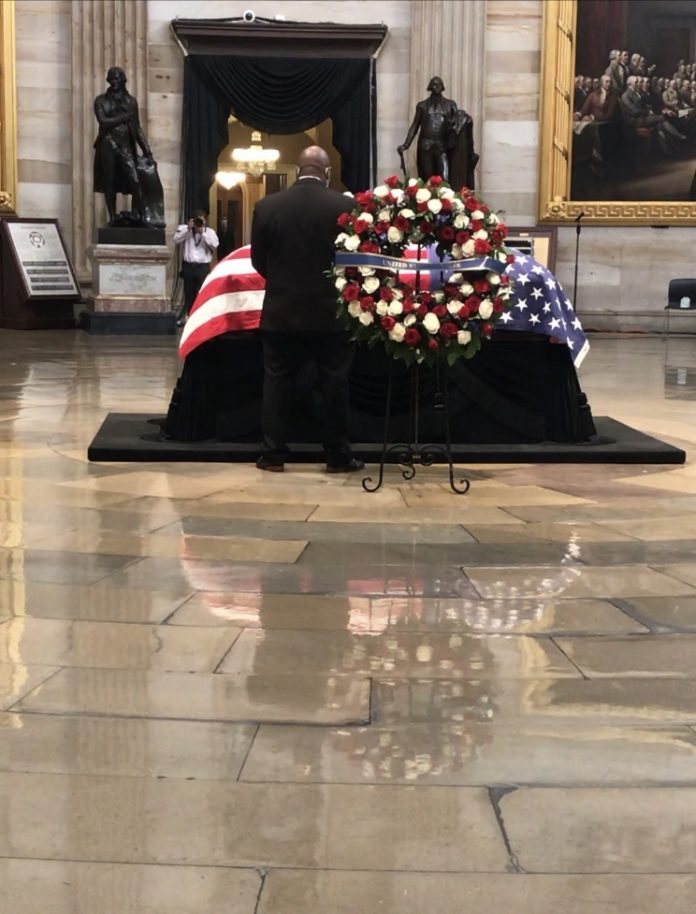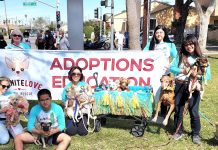
By Ronald Penh
Anthony Dixon, 51, works for the LA County fire department, is a Gardena resident, and is the nephew of the late John Lewis, a leading figure in the civil rights movement.
John Lewis was the youngest member of the big six, the driving forces of the civil rights movement. He later was elected as a house of representative for the state of Georgia’s 5th congressional district. He vehemently fought for disadvantaged people overseeing multiple renewals of the voting rights act, calling for healthcare reform, measures fighting poverty, and improvements in education. Lewis passed away on July 17, 2020 at the age of 80.
Dixon grew up knowing his uncle was a leading figure of the civil rights movement, an experience not many have to share.
“Growing up, my brothers and I, we always just looked forward to when uncle John and aunt Lily came to town,” Dixon said. “But as we got older and we realized who my uncle (is), not only who he is, but what he’s done for so many people, and just for the civil rights movement and stuff like that, that always became an ‘oh wow.’”
Lewis was leader of the Freedom Riders, a group that travelled through the Jim Crow south in protest to the segregation laws that existed.
Dixon’s son and his discovery of the Bloody Sunday event was an emotional learning experience as he was astounded to learn that his great uncle was part of a historic event where he was beaten by police officers.
“My son, when he was maybe 19 or 20, he watched a documentary about the Freedom Riders, and he called me up and he was just in tears,” Dixon said. “And I’m like, ‘Dude, what’s wrong’ and he goes ‘Dad, I didn’t know that uncle John was beaten the way he was.’”
On Sunday, March 7, 1965, Lewis led 600 protestors across the Edmund Pettus Bridge in Selma, Alabama in an effort to express the desire of African-American citizens to exercise their right to vote. Although African-Americans were granted the right to vote in 1870 through the ratification of the 15th Amendment, exercising that right to vote became a challenge through the implementation of literacy tests, poll taxes, the terrorizing of black communities from the Klu Klux Klan, and Jim Crow laws.
The march would take place from Selma to Montgomery, Alabama. The peaceful protest became a transformative event in history as photos and videos of the protestors being assaulted and brutalized by local police officers grabbed the attention of Americans throughout the nation.
During a visit Dixon and his son made to Atlanta to visit Lewis, Lewis gave more details on the brutality of the police attacks.
“He was telling my son these same stories, he bent his head over, and he was showing my son the scars on his head from being beaten,” Dixon said. “I remember him saying, ‘I’ve been arrested, I’ve been kicked on, I’ve been pushed, I’ve been spit on, all so we can vote, so we can sit at the same counter, so we can drink out of the same faucet.’”
The police brutality that took place also caused Lewis to develop a fear of dogs, Dixon shared.
The march and the events that transpired from it led to the passing of the Voting Rights Act of 1965, one of the most significant pieces of civil rights legislation.
Using your vote was one of the biggest messages that Lewis emphasized, Dixon shared.
“He was so adamant about voting. He was so adamant about ‘Make sure you vote, make sure you go out and just be a person who votes, and do good by everybody’ and that was both what my aunt and uncle always stood for,” Dixon said.
In addition to the historical influence, bravery, and perseverance his uncle had, Dixon admired Lewis as a family man and a people person.
“One thing about my uncle is that he wasn’t one of those politicians that was unreachable, he wanted to be around people,” Dixon said. “He wanted to say hello, he wanted to offer a picture, or sign an autograph or whatever.”
Dixon shared a time where Lewis and his family had a meal at Carrows Restaurants on Redondo Beach Boulevard. While they were there, people began to notice that John Lewis was at the restaurant, and people began lining up to talk to him, Dixon recalled.
“He never once raised an eyebrow on it, or was like ‘Okay I got to go,’” Dixon said. “He stood there and talked to every last person.”
One of the last photos taken of John Lewis was him standing at the Black Lives Matter Plaza in D.C.
“When we talked, I knew that he was supportive of the Black Lives Matter movement,” Dixon said. “He had a definite support for them.”
The loss of a historical figure brings about nostalgia and the memorial of the individual’s accomplishments. Lewis was a significant catalyst in the civil rights movement whose legacy evolved into his political action as a congressman. Lewis’ legacy to Dixon will live on for his contribution to the country through his historical accomplishments, and his service to his family as uncle John.



















